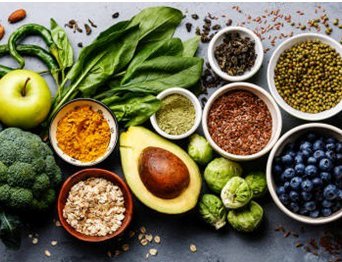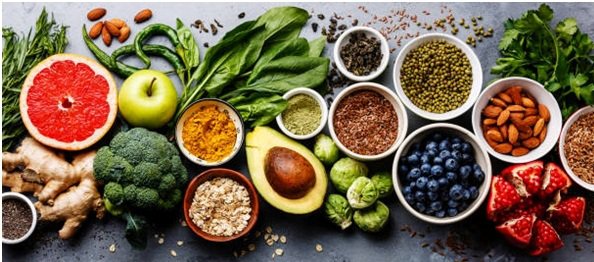
Depression and anxiety are the most common mental health conditions worldwide, making them a leading cause of disability. Even beyond diagnosed conditions, subclinical symptoms of depression and anxiety affect the wellbeing and functioning of a large proportion of the population. Therefore, new approaches to managing both clinically diagnosed and subclinical depression and anxiety are needed.
What we observe is a vicious circle—unhealthy food can worsen depression and depression leads to unhealthy eating. People who mostly consume fast food, commercial baked goods and processed foods such as fries, fried chicken, and packaged biscuits, cookies, and cakeswere 37 percent more likely to be depressed than people who avoided junk foods. The more they consumed, the greater the depression risk (Sánchez-Villegas et al., 2012).
Science behind nutrition
Micronutrients are required for the synthesis of many chemical messengers in the brain known as neurotransmitters. The four major neurotransmitters that regulate mood and commonly known as happy hormones are Serotonin, dopamine, γ-aminobutyric acid (GABA), and noradrenaline.

These chemical messengers are necessary to balance the intensity of signals between neurons in the brain and the rest of the body. Low levels of serotonin in particular have been linked with neurological disorders, anxiety and depression.
Vitamin B(such as milk, cheese, eggs, spinach, nuts, bananas, chicken, red meat, etc) are essential cofactors for the synthesis of neurotransmitters. Choline(a nutrient similar to Vit B) is a unique nutrient because it is not classified as a vitamin or a mineral. However, it is required for the production of the neurotransmitter acetylcholine, which is involved in mood and memory. Some evidence shows that folate, zinc, magnesium, iron, selenium and vitamin D may be protective against anxiety, mood swings, and irritability (Bjørklund et al., 2018 ). Numerous studies have shown that patients diagnosed with depression are often deficient in one or more of these micronutrients. Hence a well-balanced diet will provide adequate sources of these nutrients, as they are commonly found in a variety of foods.
Gut mood connection
According to the studies, our gut microbiota is linked to anxiety, depression, and even schizophrenia (Madan et al., 2020; Rodrigues-Amorim et al., 2018; Simpson et al., 2020) . A poor diet is a risk factor for these conditions. Supporting a healthy gut microbiome with a healthy diet of unprocessed foods and probiotic foods and supplementation is not only beneficial in preventing and treating depression but can be as effective as anti-depressant medications.
Serotonin is a neurotransmitter responsible for regulating our moods, sleep, and appetite and it also inhibits pain. A lack of serotonin has long been blamed as the cause of depression, and this is often the case. However, we’re learning that the lack of serotonin can be a symptom of chronic inflammation and inadequate gut flora. We now know that 95% of serotonin is produced in the gut and that the presence of enough beneficial bacteria is essential for proper serotonin production. So if we have a history of antibiotic use or were not exposed to enough bacteria in birth or childhood, we may not produce enough serotonin(June 2018).
The connection between diet and emotions stems from the close relationship between your brain and your gastrointestinal tract, often called the “second brain.” Your Gastro-Intestinal tract is home to billions of bacteria that influence the production of neurotransmitters (Dopamine and Serotonin), chemical substances that constantly carry messages from the gut to the brain.
Eating healthy food promotes the growth of “good” bacteria, which in turn positively affects neurotransmitter production. A steady diet of junk food, on the other hand, can cause inflammation that hampers production. When neurotransmitter production is in good shape, the brain receives positive messages and it can be easily reflected in your emotions. But when the production is limited the mood gets affected.
When the diet is healthy there are likely to get fewer mood fluctuations, and overall happier outlook and an improved ability to focus. There is a research which indicates that healthy diets help with symptom of anxiety and depression and unhealthy diet carries the risk of dementia and stroke. The food that supports Body-Mind wellbeing is healthy fats like avocado, coconut oil, ghee etc, colorful vegetables & antioxidant fruits and naturally fermented probiotic foods. ( June, 2018) .
Energy and mood
The brain requires glucose as its main source of fuel. In fact, the brain uses 20% of the glucose needed by the body, which means we require carbohydrates throughout the day for our brain to function at its best. The Glycaemic Index of a food refers to the rate at which carbohydrates (glucose) are released into the blood. High Glycaemic Index foods, such as processed foods, sugar-sweetened beverages, confectionery and cakes can cause dramatic spikes and drops in blood glucose. This fluctuation in blood glucose is often referred to as the ‘sugar high’ and ‘sugar crash’ and is associated with irritability, lack of concentration, feeling weak and mood swings. Sharp peaks in blood glucose can also trigger the stress hormone cortisol. One study suggests that consuming high Glycaemic Index food is associated with an increased risk of depression ( Gangwisch et. al., 2015 ).
It is recommended to choose low Glycaemic Index food because they allow our blood glucose levels to rise and fall slowly. These foods are typically high fiber whole grains, oats, fruits and vegetables. Furthermore, eating regular, well-balanced meals with a combination of carbohydrate, protein and healthy fats provides stable blood glucose levels throughout the day as fat and protein can slow the rate of carbohydrate absorption. For example, combining boiled potatoes (high Glycaemic Index) with Rajma, Chana, or Dal (protein & fiber) could help to prevent any sudden crashes in glucose for the brain and subsequent mood disturbances.

Here is the list of the food items that one can incorporate for good mood.Whole foods like fresh fruits and vegetables and food rich in fibre (apple, carrot, lentil, broccoli, banana, bamboo shoot) absorbs glucose in your body and helps in avoiding sugar rush and crashes. Food rich in antioxidants which are also inflammation fighters are found plenty in strawberries, leafy green vegetables, turmeric and food rich in omega – 3 fatty acids like flaxseeds, chia seeds and walnuts. Food rich in Vitamin D (such as mushrooms, cheese, egg yolks, tuna, salmon, dairy products, orange juice and Tofu) helps with production of serotonin, and Magnesium (pumpkin seeds, almonds, spinach etc. helps with everything from nerve and muscle function to keeping the heartbeat steady. A mineral deficiency can hurt the bacteria in your gut and cause depression and anxiety like symptoms. Then comes the probiotics(kimchi, kombucha, yogurt etc.) which we can get from fermented food has live bacteria that are good for your digestive tract.
Food for thought
Incorporating nutritious food into your diet can take some extra effort at first but once it’s become a lifestyle it has long term benefits. Moreover general nutrition rules like staying hydrated, not skipping meals and being mindful of your caffeine and alcohol intake can directly impact your anxiety level. Being mindful of the healthy foods entering your body is also affective especially when it comes to combating cravings. Appreciate each smell, taste, texture for each food. Make a note of how the nutritious snack and meals make you feel forward. It may take days or week before you start to feel the mood-boosting effects of your diet depending how many changes you can implement. Accommodate regular exercises along with diet to observe affective changes in the anxiety and depressive mood.
There are many psychological, social and biological benefits of eating meals with other people. They give us a sense of rhythm and regularity in our lives, a chance to reflect on the day, and feel connected to others. Biologically, eating in upright chairs helps with our digestion. Talking and listening also slows us down so we don’t eat too fast.
We should try making the most of mealtimes by setting aside at least one meal in a day to eat with the family. One can choose a meal that’s easy to prepare so it doesn’t become a chore. Share responsibility so everyone has a different task like doing the shopping, setting the table, cooking or washing up and among others. Keep the television off so you can all talk and share (Feldman et. al., 2007).
The author is the Chief Executive Officer of Chaitanya Institute for Mental Health, Nepal.Email: chaitanyarehabnepal@gmail.com.
- Mental Health Challenges
- Apr 08, 2024
- How To Practice Emotional First Aid?
- May 13, 2023
- The Simple Act Of Kindness Could Promote Both Mental And Physical Health.
- Oct 10, 2020













